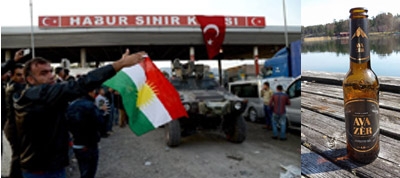Kurds Find Unity in Fighting Islamic State. And in Beer

Herdi Kader and Cesur Nujen have roots in rival parts of Kurdistan, yet their futures are united.
Sons of Kurdish immigrants to Sweden, the two came together in a bid to persuade the world to associate their people with their beer, Ava Zer, Kurdish for “gold water,” rather than the violent conflict with Islamic State in Iraq and Syria.
“I want people to drink our beer and say, ‘Wow, Kurds, they know how to make beer,’” Kader said by telephone from Stockholm. “It’s good for the Kurdish people because what’s happening now is not very good for them.”
It may be just a business venture thousands of miles away, but Kader, 31, and Nujen, 33, are a rare collaboration among Kurds not on the battlefield. As the fractious people scattered across Syria, Turkey, Iraq and Iran puts power struggles aside to fight extremist militants, uniting the world’s largest stateless group remains elusive.
The international attention and support Kurds are getting as they fight Islamic State marks a rare opportunity for them to lay the foundations of a state either in Iraq or Syria, said Kawa Hassan, visiting scholar at Carnegie Middle East Center.
“Kurds are in a paradoxical position: They are fragmented more than ever, but they are also emerging as strong players,” said Hassan, who is also Middle East expert at Hivos, a Dutch development organization. “So their strategic usage of this newfound power depends first and foremost on their unity.”
Disparate Group
Kurds are estimated to number about 30 million based on population figures in the CIA World Factbook. They speak a range of dialects and are backed by varying regional supporters whose rivalries are often reflected through their Kurdish proxies.
The two main Kurdish factions in Iraq are at odds with the Turkish Kurdish rebel group PKK. The Iraqi groups fought a bloody civil war in the mid-1990s, before agreeing to a power-sharing deal in 1998. The semi-autonomous Kurdistan Regional Government based in Erbil later emerged as a key U.S. ally in the war against Saddam Hussein.
Brewers Kader, whose family hails from the Iraqi Kurdistan area of Suleimaniyah, and Nujen, whose roots are in the Turkish city of Diyarbakir, reflect the divide. They describe themselves on their company website as “two boys from different parts of Kurdistan who grew up in Sweden in an environment with people’s stories.” They met as adults.
For now, their beer is made in the Czech Republic. They plan one day to set up in Kurdistan.
“We want to grow the company to a level where we can actually invest in Kurdistan,” said Kader.
Peshmerga Fighters
The disintegration of Syria and deterioration in Iraq brought Kurds face-to-face with the extremist Sunni group as it sought to expand the entity it carved out on territory straddling the Iraq-Syria border in June.
Iraqi Kurds are fending off advances around their semi-autonomous region. A car bomb outside the governor’s office in Erbil left four people dead yesterday. Kurdish security forces managed to minimize the loss of life by intercepting the bomber, Stratfor Global Intelligence said.
They sent their Peshmerga fighters to Kobani to bolster defense of the besieged Syrian city in a rare show unity with the PYD group, an affiliate of PKK, which is listed a terrorist organization by the U.S., European Union and Turkey.
Iraqi Kurdish leader Massoud Barzani last month brokered a pact between rival Syrian Kurdish groups. Turkish Prime Minister Ahmet Davutoglu is traveling to Erbil to meet Barzani and discuss the battle against militants.
They are fighting as “one fist,” Meryem Kobane, a Syrian Kurdish rebel commander, said by telephone from the front line. “We are children of the same house who formed a united front against a violent group,” she added.
World’s Attention
Conversely, the violence has benefited the Kurds, according to Michael Werz, a senior fellow at the Center for American Progress, a Washington-based institute founded in 2003.
It has opened international doors, with U.S. and European allies committing to helping them after Islamic State captured villages and towns around Iraqi Kurdistan.
“Kurdish groups in general are in a better strategic and political situation than before the disintegration of Syria and the massive problems in Iraq,” Werz said by e-mail.
While the region in Iraq has attracted investment to its oil industry and hotels, offices, shopping malls and trophy homes have sprung up in Erbil, among the challenges Kurds face is economic independence, according to Hassan at the Carnegie Middle East Center, speaking from Amsterdam.
Baghdad Dispute
Dependence on Baghdad has been highlighted since the beginning of the year when the Iraqi government refused to send Kurdistan’s share of the budget because of a dispute over oil, leaving more than 1 million government employees and retirees without salaries since end of July.
The Kurds this month reached a partial oil-export deal that left them reliant on Baghdad. Under the agreement, oil will be exchanged for revenue from the central government.
What’s more, while the Kobani crisis has helped increase Kurdish nationalism and collective identity across borders, “this does not mean that the Kurds are any closer to statehood,” said Ramzy Mardini, a non-resident fellow at Atlantic Council’s Rafik Hariri Center for the Middle East.
U.S. Secretary of State John Kerry said in an interview on Oct. 31 that “it’s distinctly not the time for a lot of reasons” and that “we need to take one thing as a time.”
For Kader back in Stockholm, his beer is an opportunity to provide “something to the beautiful Kurdish culture” he had heard about from his parents. He and his partner started selling Ava Zer in May in Sweden.
The next step will be neighboring European countries and then to grow internationally. There’s already plenty of interest in the beer from Kurdish regions, he said.
“My vision of a perfect Kurdistan is obviously a fairy tale,” said Kader. “We can be Kurds. Basically, we can be ourselves.”
Bloomberg













